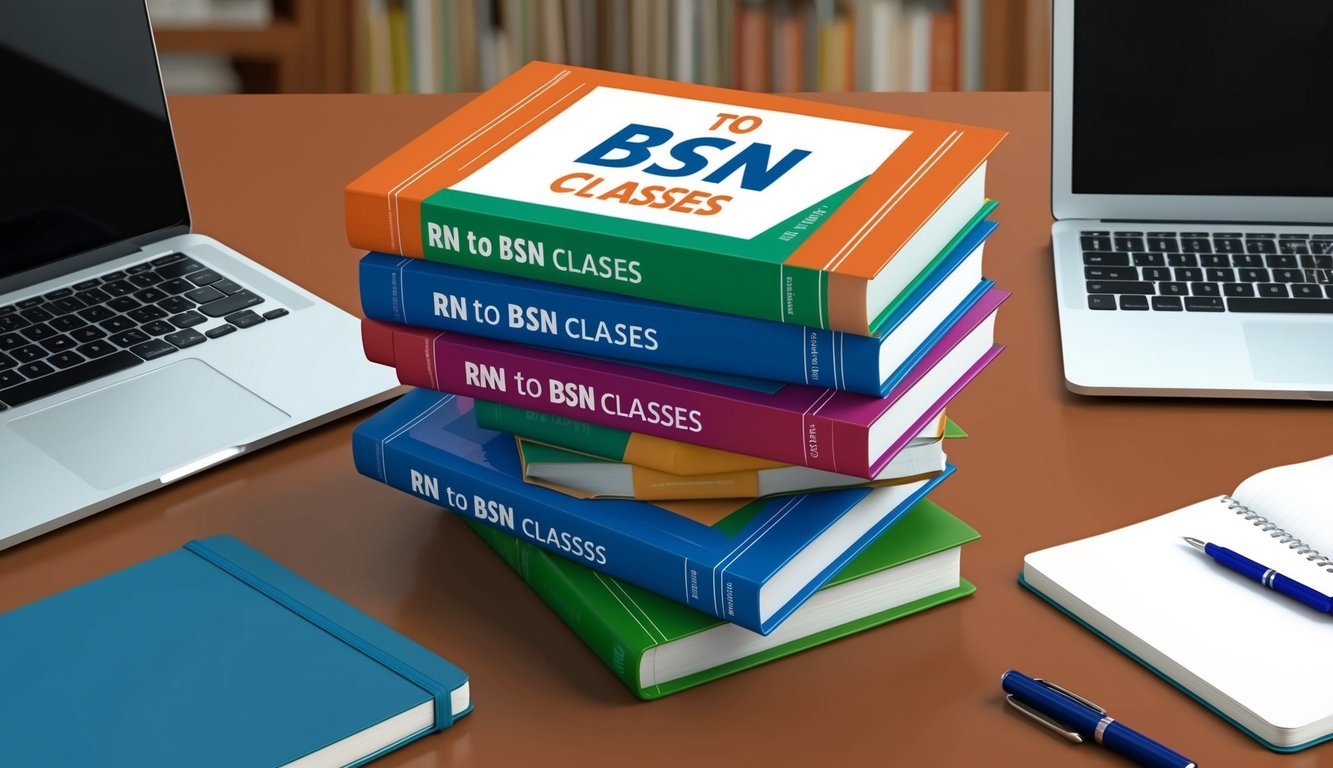RN to BSN classes are an important step for registered nurses looking to advance their careers.
Most programs are flexible, allowing you to balance your studies with work and personal commitments.
These classes typically cover essential topics in nursing theory, healthcare management, and evidence-based practices, helping you enhance your skills and knowledge.
Many programs now offer online formats, allowing for greater accessibility and convenience.
You will also engage in clinical practice experiences to apply what you learn in real-world settings.
Knowing what to expect throughout your RN to BSN journey can help you prepare for this educational pathway.
Key Takeaways
- RN to BSN programs often provide flexible online learning options.
- The curriculum focuses on essential nursing topics and real-world applications.
- Students typically receive support and resources to assist them during their studies.
Exploring the RN to BSN Pathway
The RN to BSN pathway allows registered nurses to advance their education and enhance their professional identity.
Earning a Bachelor of Science in Nursing (BSN) can provide you with essential skills for career growth and additional opportunities in the nursing field.
Understanding the BSN Degree
A BSN degree represents a significant step in your nursing education.
This degree usually requires you to complete around 120 credit hours, which include core nursing courses, liberal arts, and sciences.
Programs like the RN to BSN Pathway are designed to accommodate working nurses, often allowing you to complete your degree online.
Here’s a breakdown of typical components in a BSN program:
| Component | Description |
|---|---|
| Nursing Core Courses | Advanced topics in patient care |
| Leadership & Management | Skills to lead teams and manage care |
| Research Methods | Techniques to assess and implement care |
Completing a BSN can open doors to various healthcare settings, including leadership roles.
Advantages of Transitioning from RN to BSN
Transitioning from an RN to a BSN can significantly boost your nursing career.
One key advantage is improved job prospects.
Hospitals and healthcare facilities increasingly prefer or even require a BSN for many positions.
Some benefits include:
- Higher Earning Potential: Nurses with a BSN generally earn higher salaries than those with an ADN or diploma.
- Expanded Career Opportunities: With a BSN, you may qualify for roles in management, education, or specialized nursing fields.
- Enhanced Skills: The curriculum often includes critical thinking, leadership, and public health, which are essential for modern patient care.
Consider programs like the University of Texas at Arlington that offer flexible online options, helping you balance education with work.
Choosing this pathway not only advances your education but also strengthens your professional identity in the nursing field.
Academic Framework and Curriculum

The academic framework for RN to BSN programs is designed to build upon your existing nursing knowledge while incorporating essential general education courses.
This blend prepares you for advanced nursing roles through a comprehensive curriculum that emphasizes evidence-based practice and specialized nursing theories.
Core Nursing Courses
Core nursing courses form the backbone of the RN to BSN curriculum.
These classes focus on critical areas such as nursing theory, anatomy and physiology, and microbiology.
You will explore topics like patient-centered care, health assessments, and community health nursing.
Courses typically include:
- Health Assessment in Nursing
- Community Health Nursing
- Nursing Research and Evidence-Based Practice
These subjects help you understand the importance of scientific principles in nursing and how to apply them in real-world settings.
General Education Requirements
General education is vital in rounding out your nursing education.
These courses include topics such as:
- Psychology
- Sociology
- Statistics
You will gain valuable insights into human behavior and social systems, which are essential for effective patient interaction.
Statistics is particularly important as it equips you with skills to analyze data and understand research studies in nursing.
General education courses ensure that you have a well-rounded educational background, enhancing your ability to think critically and engage with diverse patient populations.
Specialized Nursing Theories and Practices
Specialized nursing theories focus on advanced clinical practices and the application of evidence-based practice.
You will study topics like:
- Advanced Pharmacology
- Leadership in Nursing
- Ethical and Legal Issues in Nursing
Understanding these theories will prepare you to make informed decisions and advocate for your patients.
The focus on leadership will also help you develop the skills needed to guide teams and influence healthcare outcomes effectively.
By incorporating these specialized courses, you will be better equipped to face the challenges of modern nursing and contribute positively to patient care.
Online Learning and Program Formats
The rise of online education has transformed how nursing students pursue their RN to BSN degrees.
You have various options that cater to your needs, enhancing flexibility and learning experiences.
Online BSN Program Options
When selecting an online RN to BSN program, you’ll find multiple formats to choose from.
Many institutions offer fully online courses, allowing you to complete your degree without needing to attend classes in person.
Programs often require around 30 to 32 credit hours, which you can complete at your own pace.
Some may also offer hybrid formats, blending online coursework with in-person clinical training.
Be sure to check specific admission requirements, such as having an associate degree in nursing and a minimum GPA.
Flexibility and Access of Online Education
One of the biggest advantages of online BSN programs is flexibility.
You can access course materials anytime and anywhere, making it easier to balance your studies with work or family commitments.
Most programs allow you to choose between part-time and full-time study.
This means you can adjust your course load based on your personal schedule, making it ideal for busy professionals.
In addition to flexibility, many online platforms provide access to a wealth of resources, such as discussion forums, video lectures, and interactive assignments.
Accelerated Learning with ExcelTrack
ExcelTrack options can significantly shorten the duration of your RN to BSN journey.
This innovative format allows you to progress through your coursework at your own speed based on your existing knowledge and skills.
In an ExcelTrack program, you complete assessments to demonstrate mastery of subjects.
This approach can lead to faster completion of your degree since you can advance as quickly as you are able.
With the opportunity for experiential learning, you can apply real-world skills gained through your nursing experience directly to your studies.
This method promotes deeper understanding and retention of course materials.
Clinical Practice and Experiential Requirements
In RN to BSN programs, clinical practice is vital for developing essential nursing skills.
You will be expected to engage in clinical experiences across diverse settings, which will enhance your clinical reasoning and judgment.
Clinical Experience in Diverse Settings
You will need to complete a certain number of clinical hours to satisfy program requirements.
These hours can occur in various environments, including hospitals, community clinics, and specialized health care facilities.
Diverse clinical settings provide exposure to different patient populations and health issues.
This exposure helps you build a broad skill set.
You will practice essential clinical skills such as assessment, communication, and patient care.
- Typical settings include:
- Hospitals
- Long-term care facilities
- Home health agencies
- Community health organizations
Each environment will challenge you differently and expand your perspective on patient care.
Developing Clinical Judgment
Developing clinical judgment is crucial for effective nursing practice.
During your clinical experiences, you will engage in decision-making processes that require critical thinking.
You will learn to evaluate patient needs, prioritize interventions, and apply evidence-based practices.
Key aspects of clinical judgment include:
- Clinical reasoning: Analyzing patient data to make informed decisions.
- Reflection: Assessing your actions and their outcomes to improve future practice.
- Feedback: Gaining insights from instructors and peers about your clinical performance.
These elements will help you become a more competent nurse.
Engaging in hands-on practice is essential for translating classroom knowledge into real-world applications.
Support and Resources for Students
As you navigate your RN to BSN program, having access to support and resources can enhance your educational experience.
This section covers essential aspects such as financial planning and licensure information to help you succeed in your nursing career.
Financial Planning for Nursing Students
Managing finances is critical while pursuing your degree.
Consider exploring financial aid options available for nursing students.
Many institutions offer grants, scholarships, and loans tailored to help cover tuition costs.
It’s important to complete the Free Application for Federal Student Aid (FAFSA) to determine your eligibility.
Also, use a tuition calculator provided by institutions like Purdue Global to estimate your total costs.
This tool helps you understand tuition fees and additional expenses, making budgeting easier.
Lastly, create a financial plan that includes your expected income, expenses, and potential debt.
You may also want to consult a financial advisor familiar with education financing to optimize your budget.
Licensure and Accreditation Information
Understanding licensure and accreditation is crucial for your nursing career.
After completing your RN to BSN program, you will need to obtain your nursing license.
Each state has specific licensure requirements, typically involving passing the NCLEX-RN exam.
Ensure that your program is accredited by recognized bodies, such as the Commission on Collegiate Nursing Education (CCNE) or the Accreditation Commission for Education in Nursing (ACEN).
Attending an accredited program ensures the quality of your education and meets the standards for licensure.
Additionally, be aware of the admissions requirements for your chosen program.
This typically includes having an active RN license, fulfilling prerequisite courses, and submitting documentation such as transcripts and letters of recommendation.
These factors are critical to ensuring a smooth transition from your current practice to your educational goals.
Frequently Asked Questions

This section provides answers to common questions about RN to BSN programs.
You’ll find details on duration, institutions, clinical requirements, affordability, prerequisites, and the value of an RN to BSN degree in the job market.
What are the typical duration options for RN to BSN programs?
Most RN to BSN programs offer flexible duration options.
Many programs can be completed in one year if you attend full-time.
Part-time options are also available, and these extend the duration to around two years.
You can find specific timelines based on the program structure and your personal commitment.
Which institutions offer the fastest track to complete an RN to BSN program?
Several institutions provide accelerated tracks for RN to BSN programs.
For example, Purdue University Northwest allows you to earn your BSN in as few as 10 months.
Other programs may also offer similar fast-track options, so consider reviewing multiple schools to find the best fit for your schedule.
How do online RN to BSN programs accommodate clinical practice requirements?
Online RN to BSN programs typically include a hands-on component for clinical practice.
Many universities arrange partnerships with local healthcare facilities for your clinical hours.
This helps you apply what you learn in a real-world setting.
Make sure to check the specifics with your chosen program.
Can you list affordable accredited RN to BSN online programs?
You can find several affordable online RN to BSN programs.
Some programs, like those at South Dakota State University, offer competitive tuition rates and flexible payment options.
Research institutions that provide reduced rates for in-state and out-of-state students to find the best costing options.
What are the prerequisites for enrolling in an RN to BSN program?
Prerequisites for RN to BSN programs often include having an associate degree in nursing.
You usually need to have your RN license before applying.
Some programs might also require a certain number of college credits in courses like microbiology or statistics.
Do employers value an RN to BSN degree, and how does it impact career prospects?
Employers generally value the RN to BSN degree.
It can enhance your knowledge and skills, making you a more competitive candidate.
Many healthcare facilities prefer or require nurses to have a BSN for leadership or specialty positions.
This can lead to better job opportunities and higher salaries.

